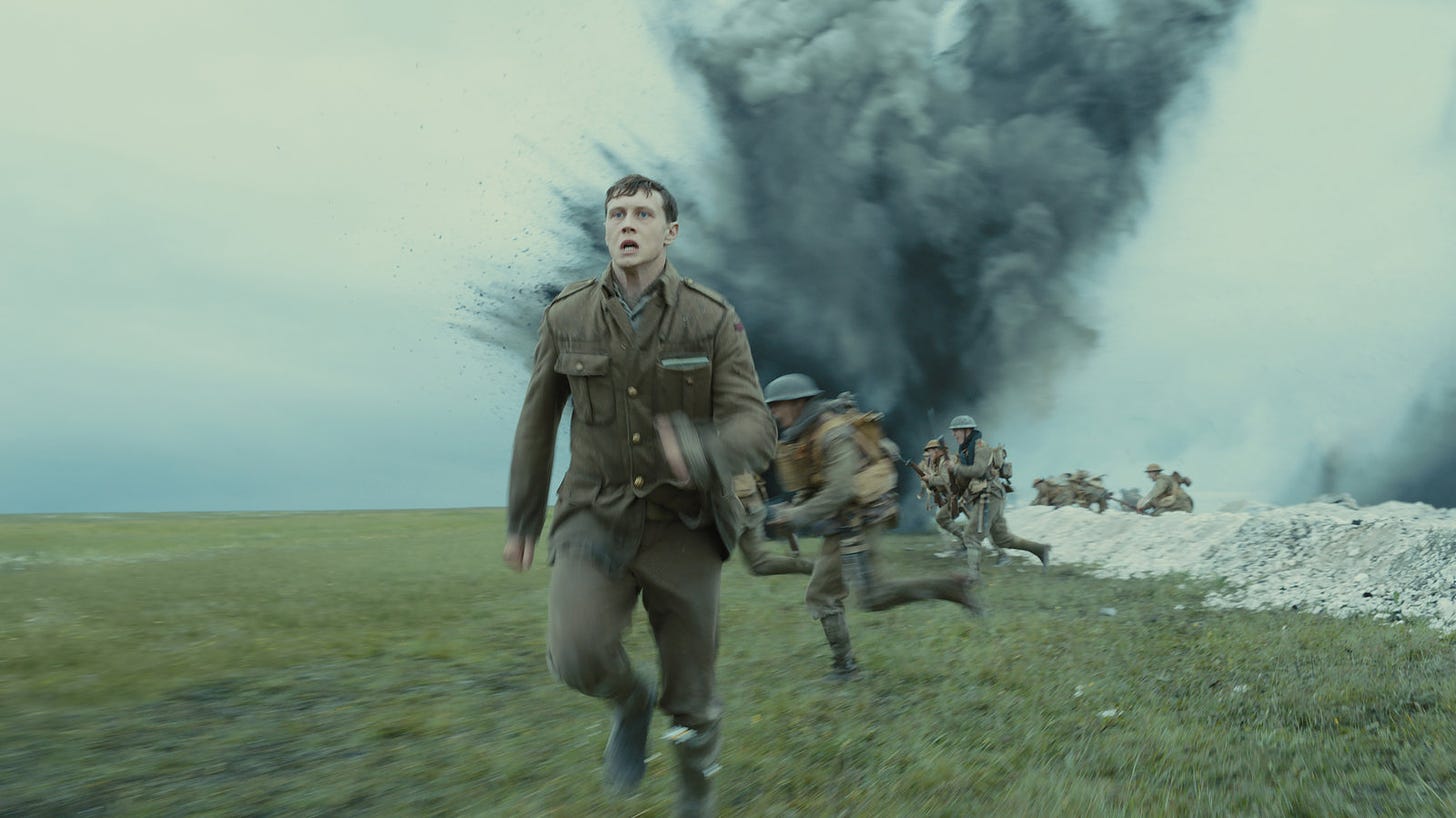Sam Mendes: What's the deal with this guy?
A look back on a career of an acclaimed director whose work is frequently less than meets the eye.
I’ve been writing film reviews professionally for over 20 years. According to my Rotten Tomatoes page, the current tally is over 1,600 reviews and counting, though that’s surely well short of the total number, given broken links or lost web pages or other holes in the net. And while objects do tend to shift during flight—no critic (or human) has a fixed opinion on anything—the review I’ve always wanted to take back, for virtually that entire period, is my rave for Sam Mendes’ American Beauty, a film that would go on to win Best Picture in 1999, a year so legendarily great that Brian Raftery wrote a book about it and the rest of us spent 2019 doing retrospective pieces and podcasts about it.
The seeds of my eventual misgivings were planted in my review—“Mendes and screenwriter Alan Ball, both making their feature debuts, resort to a few heavy-handed tactics to get their points across”—and they flowered quickly after it was published, as certain aspects of the film started to curdle in my mind. My solution was never to revisit American Beauty, and chalk up my response to its surface appeals, like the vivid pop of Conrad Hall’s photography, which painted the suburbs as a sterile, lacquered utopia, or a lead character, in Lester Burnham (Kevin Spacey), who was upending his life as freely as Peter Gibbons (Ron Livingston) had in Office Space that same year. And I fell for that fucking plastic bag, too.
Three years ago, Mendes’ World War I thriller 1917 seemed poised to do to the films of 2019 what he did the films of 1999, winning the Best Picture Oscar as veteran filmmakers—Bong Joon-ho (Paradise), Martin Scorsese (The Irishman), Noah Baumbach (Marriage Story), Pedro Almodóvar (Pain and Glory), Quentin Tarantino (Once Upon a Time… In Hollywood), etc.—were in peak form, to say nothing of critical favorites from Greta Gerwig (Little Women), Joanna Hogg (The Souvenir), and Celine Sciamma, whose Portrait of a Lady in Fire made the biggest splash of any newly eligible film to the 2022 Sight & Sound “Greatest Films of All Time” poll. That didn’t happen, despite 1917 winning both Best Director and Best Picture (Drama) at the soon-to-be-disgraced Golden Globe awards, but the threat of Mendes as a middlebrow spoiler looms large.
This year, Mendes is back with another prestige drama, Empire of Light, that seems to be going nowhere with critics and audiences, despite plugging into the current nostalgia for the theatrical experience. It’s set around a beautiful movie theater on the English coast in the early ’80s, focusing on the relationship between a manager (Olivia Colman) struggling with mental illness and a younger Black employee (Micheal Ward) who’s facing a spike in racial hatred seizing the country. It sounds like a very specific memory of that time and place, but it doesn’t actually play that way.
Which brings me to a surprisingly vexing question about Mendes: What’s the deal with this guy?
One reason the question is so vexing is that until his last two features, Mendes hadn’t written any of his own scripts. He co-wrote 1917 with Krysty Wilson-Cairns, which was inspired by a story Mendes’ paternal grandfather, Alfred Mendes, told about his experiences. That was the first time that a Mendes film had been talked about as “personal,” and the first time that he hadn’t ceded his point of view to a stronger voice: original screenplays by Ball (American Beauty) and Dave Eggers and Vendela Vida (Away We Go); books by Max Allan Collins (Road to Perdition), Anthony Swofford (Jarhead), and Richard Yates (Revolutionary Road); and two straight James Bond movies (Skyfall, Spectre) that are shackled to longstanding prerequisites. He expresses himself through impeccable technique, but it’s not easy to guess at what, exactly, he’s trying to express.
To answer this question, I rewatched all nine of his features, starting with the dreaded American Beauty, which was not only worse than I’d feared, but the worst title in his filmography by some distance. For a British director, Mendes’ persistent interest in American domestic life, here and in films like Revolutionary Road and Away We Go, is a fascinating wrinkle—or it would be if he didn’t consider it so broadly, as emblematic rather than specific. American Beauty isn’t about the Burnhams and their friends and neighbors, but all the things they represent: The breakdown of the nuclear family, the emptiness of consumerism (“It’s just a couch!”), sexual repression or deviance, and the hidden beauty all but the weirdest creep in school take for granted.
When Mendes cast an eye to suburbs past with Revolutionary Road, his brittle downer about a marriage in the Eisenhower era, the same problems persisted, albeit more subtly. There’s something admirably perverse about reuniting the stars of Titanic, the biggest romantic phenomenon of its era, and sticking them in a union defined by compromised dreams, mutual resentment, and horrific tragedy. Yet Mendes put The Suburbs in capital letters again, casting it as a conformist pit that swallows the ambitions and happiness of those who might buck against its conventions. It was left to Michael Shannon, in two great scenes, to jolt this moribund drama with defibrillator paddles, but even he has to transcend the stock character of a truth-telling crazy person.
Just a year later, Mendes seemed eager to leave this hermetic tomb and hit the open road, but Away We Go felt like his approximation of indie comedies like Garden State, built off the contrived premise of a hip couple (John Krasinski and Maya Rudolph) trying to find the right place to raise the child they’re expecting. With songs by Alexi Murdoch, who’s like a coffeeshop Nick Drake, the film zigzags across North America to visit old friends and relatives in places like Phoenix, Madison, and Montreal, but everything is overcranked, especially the comedy. It never gets worse than Maggie Gyllenhaal as a nightmare feminist academic named LN (or “Ellen”) who stands for every New Age parenting idea you’ve ever rolled your eyes at. But even a down-to-earth situation, like a married couple that’s adopted many children but can’t have one of their own, is undone by a bizarre scene where the wife does a melancholy pole dance on Amateur Night a few days after her latest miscarriage.
From the beginning, Mendes’ attention to the fussy particulars of style—helped along by some of the best cinematographers in the business, including multiple films with all-time greats like Hall and Roger Deakins—has left the dramatic soul of his work untended. We can admire the crisp fedoras, gleaming Model A cars, and classic Tommy Guns of Road to Perdition, but Collins’ graphic novel requires the kind of pulpy kick that brought Brian De Palma’s The Untouchables to life, not the empty gravitas Mendes brings to the table. Mendes and Deakins make the desert of Iraq of Jarhead look great, but the anecdotes in Swofford’s half-hilarious/half-chilling memoir about a Marine sniper stranded in “The Suck” don’t have the urgency of a film like Three Kings. Mendes’ films always have the patina of greatness without the actual weight of it.
That quality made him a natural for the James Bond franchise, which plays to all his strengths: the ability to execute complex sequences with precision and clarity, an obsession with production design and beautiful image-making, and a sensibility that’s suited for the largest possible canvas. After Daniel Craig’s run as Bond threatened to turf out with Quantum of Solace, Mendes’ Skyfall revived the series with one of the best 007 adventures ever, from an opening chase sequence that moves from the streets of Istanbul to the top of a speeding train to the eye candy of nocturnal Shanghai and Macau. Craig’s initial casting as Bond seemed like an adaptation to shaky-cam grit of the Bourne movies, but Mendes restores a classical glamor to Bond without making it seem ossified. And while his Spectre was a small step backwards in many regards, the bar had been raised on a franchise that seemed uncertain of itself before Mendes took over.
For better or worse, 1917 is more the Mendes of James Bond than the prestige Mendes of old, a trend-hopping technical exercise in the vein of Birdman or Gravity that thrives on movement and action. World War I classics like The Big Parade, All Quiet on the Western Front, Paths of Glory, and Gallipoli are all emphatic anti-war movies, emphasizing a grunt’s-eye-view of a pointless, horrific slog, with men penned into trenches or shredded by machine-gun nests or barbed wire the moment they’re ordered to surface. In following two British soldiers (George MacKay and Dean-Charles Chapman) on a mission to alert a battalion of a German trap, 1917 feels oddly liberating by comparison, because they enjoy a freedom of movement across war-ravaged terrain, despite the dangers they encounter along the way.
Because Mendes has filmed their journey as one continuous shot—or the illusion of one anyway—1917 has an experiential quality that’s thrilling on a surface level but disconnected from the context of the war itself, like World War I: The Ride. And while many World War I movies are about individuals trying to salvage something from a conflict unworthy of their sacrifice, 1917 only seems superficially connected to the war, as if Mendes has swapped out the backdrop of Saving Private Ryan while mimicking the basic directive. An argument could be made that the characters are wandering through the haunted, bombed-out remnants of the war, from an abandoned German trench to a village where the only civilians left are a Frenchwoman and an orphaned baby, clinging to life. But 1917 is essentially a gussied-up action movie, exciting in the moment but leaving nothing to think about afterwards.
Empire of Light is a much more curious and unsuccessful case, because it doesn’t have that natural forward momentum. In fact, stasis is a defining quality, given the go-nowhere life of its protagonist Hilary, a duty manager who’s carrying on a desultory affair with her married boss (Colin Firth), seemingly to salve her loneliness, though workplace power dynamics play a part, too. Her relationship with Stephen, a new employee, is unlikely not only due to their age and racial differences, but the fact that they don’t seem to have much in common. In a contrivance to end all contrivances, she doesn’t watch movies.
That last twist leads to an inevitable scene where she finally yields to the power of cinema, which has the effect of adding scale to a story that’s smaller than Mendes allows it to be. The intended intimacy of Empire of Light is crushed by its own overweening sense of importance. That’s the trick of Sam Mendes: He always gives you less than it seems. Each film is impeccably realized. Even in the deserts of Iraq or the trenches of northern France, every frame is so pristine that you could eat dinner off it. You may feel inclined to give his films an Academy Award or a rave review.
Regret will follow.








Amen to this: "or it would be if he didn’t consider it so broadly, as emblematic rather than specific."
I’m mixed on REVOLUTIONARY ROAD, (and on Mendes in general, though I think I like 1917 more than Scott.) But that movie has one of the cruelest, most efficient pieces of editing I’ve ever seen when it cuts from the protagonists falling in love to love’s aftermath: a miserable evening of local theater filled with disappointment for both. (And, just to confirm I looked it up and I liked it so much I wrote about it as the lede in my review at the time. Gave it a “B,” too. Hmm…)